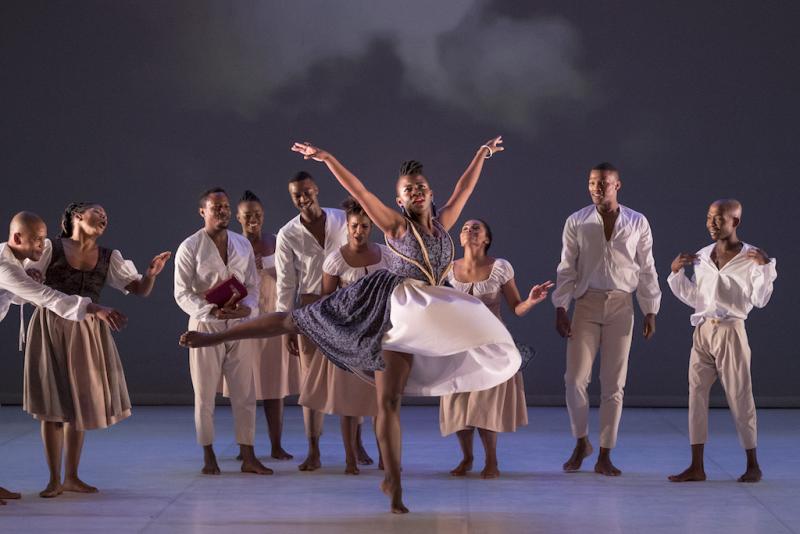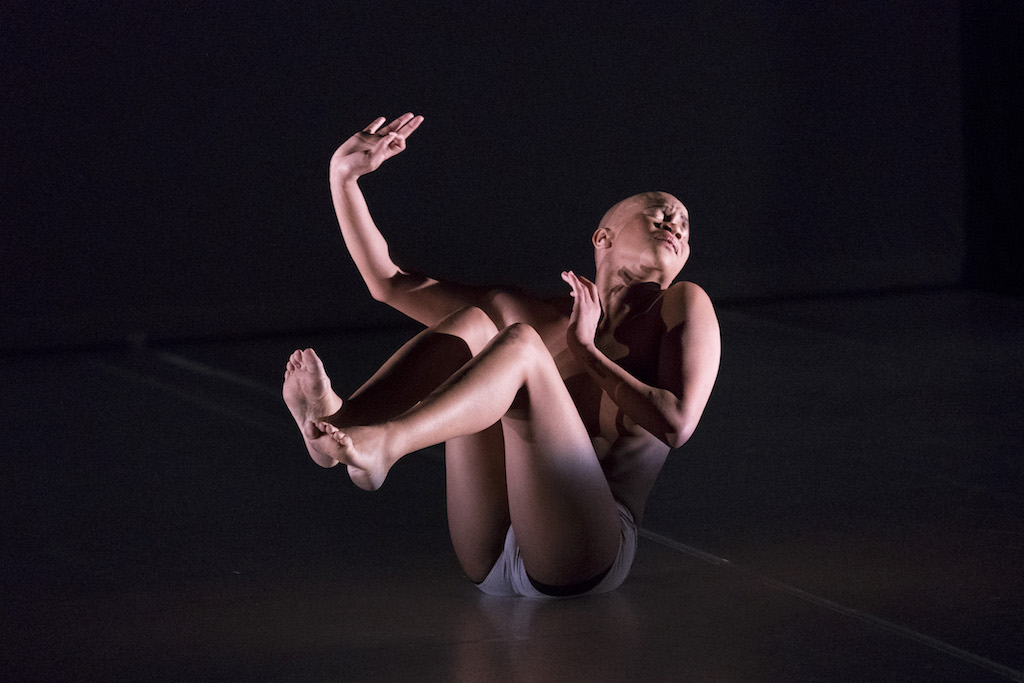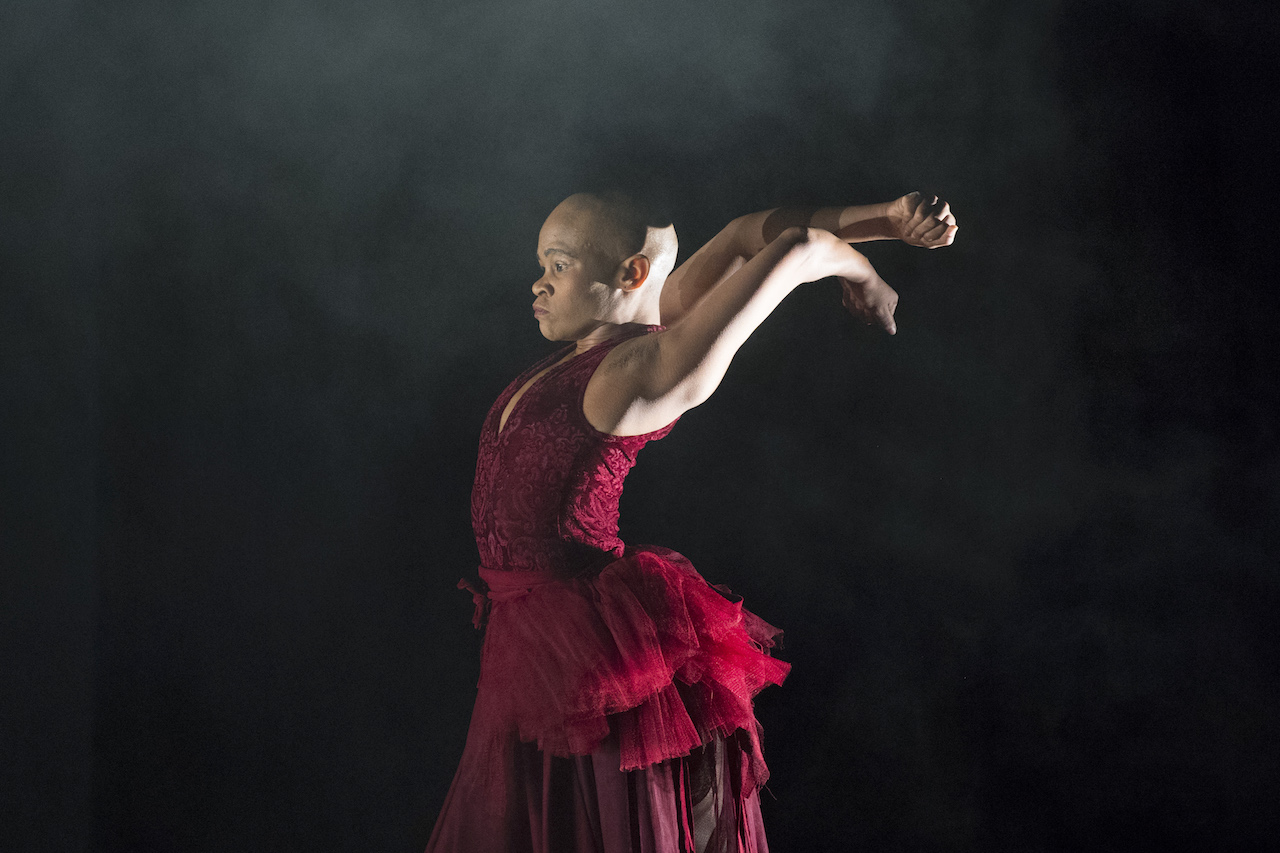Dada Masilo's Giselle, Sadler's Wells review - bold, brutal, unforgiving | reviews, news & interviews
Dada Masilo's Giselle, Sadler's Wells review - bold, brutal, unforgiving
Dada Masilo's Giselle, Sadler's Wells review - bold, brutal, unforgiving
Startling cultural retread of the romantic ballet, set in a South African village

The most arresting thing about Dada Masilo’s contemporary South African take on Giselle is Masilo herself. Tiny and boyishly slight, she inhabits her own fast, fidgety, tribal-inspired choreography with the intensity of someone in a trance.
We first meet her at work in the fields alongside other villagers. The action, like composer Philip Miller’s electronic nod to Adolph Adam’s score, keeps within hailing distance of the familiar but constantly distorts it. The tightly synchronised movement of Masilo’s 14-strong company is joyously vigorous, all busy arms and elbows, barefoot stamps and whoops. There is noisy banter and laughter, all delightful. But when key characters – Giselle’s mother, Albrecht – deliver actual speeches, the spell is broken. Explanations are unnecessary. We’ve already guessed that Giselle’s mother likes a beer or two, and that Albrecht, a ruling-class playboy from outside the village, is infatuated with Giselle. Their duet, robustly sexy and enthusiastic, leaves no doubt of that.
 The scene in which Giselle discovers Albrecht’s duplicity underlines the otherness of African rural culture. Instead of attracting sympathy from her fellow villagers, the distraught girl is publicly mocked and stripped. She has brought shame on the community as well as herself. It’s a shocking turnabout, made more so by the sight of a vulnerable young woman left shaking and broken, naked but for her white knickers. The exact cause of Giselle’s demise (pictured above) is left for us to imagine. The first act ends with her mourners traversing the stage harmonising a traditional African funeral hymn.
The scene in which Giselle discovers Albrecht’s duplicity underlines the otherness of African rural culture. Instead of attracting sympathy from her fellow villagers, the distraught girl is publicly mocked and stripped. She has brought shame on the community as well as herself. It’s a shocking turnabout, made more so by the sight of a vulnerable young woman left shaking and broken, naked but for her white knickers. The exact cause of Giselle’s demise (pictured above) is left for us to imagine. The first act ends with her mourners traversing the stage harmonising a traditional African funeral hymn.
The Wilis of Act II, then, have a double injustice to avenge. Ungendered and dressed in dark red, they are not undead brides but ancestral spirits, led by a Sangoma, a witch doctor. Llewellyn Mnguni is mesmerising in the role, pale dreadlocks creating a whirling halo around his fierce and fast solo dances. In his hand, instead of the traditional myrtle branch, symbol of chastity, he carries a fly whisk.
 An eye for an eye, brutality for brutality. Being made to dance till he drops is too good for a cheat like Albrecht. He must be dog-whipped, with Giselle the dispenser of justice. So in place of the soft, forgiving dances in the 1841 ballet which show the spirit Giselle shielding her former lover from the worst of his punishment, we get Giselle wielding a long leather lash. Deed done, the Wilis’ final solemn walk across the stage poignantly mirrors that of the mourners, and as Giselle (pictured above) reaches the body of Albrecht where it fell, she steps over it and walks on. The ballet is all over in 80 minutes, and loving forgiveness doesn’t enter the picture. Nor, for that matter, does Albrecht once show any remorse.
An eye for an eye, brutality for brutality. Being made to dance till he drops is too good for a cheat like Albrecht. He must be dog-whipped, with Giselle the dispenser of justice. So in place of the soft, forgiving dances in the 1841 ballet which show the spirit Giselle shielding her former lover from the worst of his punishment, we get Giselle wielding a long leather lash. Deed done, the Wilis’ final solemn walk across the stage poignantly mirrors that of the mourners, and as Giselle (pictured above) reaches the body of Albrecht where it fell, she steps over it and walks on. The ballet is all over in 80 minutes, and loving forgiveness doesn’t enter the picture. Nor, for that matter, does Albrecht once show any remorse.
Masilo’s production is not without its flaws: scenes don’t flow easily from one to another, and the spoken text jarrs. But as a snapshot of another culture and its mores, it has both charm and force, and the key performances are extraordinary.
- Giselle at Nottingham Theatre Royal tonight and tomorrow, then touring to Bradford, Birmingham, Salford Quays, Milton Keynes, Brighton and Canterbury
- Read more dance reviews on theartsdesk
rating
Share this article
The future of Arts Journalism
You can stop theartsdesk.com closing!
We urgently need financing to survive. Our fundraising drive has thus far raised £49,000 but we need to reach £100,000 or we will be forced to close. Please contribute here: https://gofund.me/c3f6033d
And if you can forward this information to anyone who might assist, we’d be grateful.

Subscribe to theartsdesk.com
Thank you for continuing to read our work on theartsdesk.com. For unlimited access to every article in its entirety, including our archive of more than 15,000 pieces, we're asking for £5 per month or £40 per year. We feel it's a very good deal, and hope you do too.
To take a subscription now simply click here.
And if you're looking for that extra gift for a friend or family member, why not treat them to a theartsdesk.com gift subscription?
more Dance
 'We are bowled over!' Thank you for your messages of love and support
Much-appreciated words of commendation from readers and the cultural community
'We are bowled over!' Thank you for your messages of love and support
Much-appreciated words of commendation from readers and the cultural community
 R:Evolution, English National Ballet, Sadler's Wells review - a vibrant survey of ballet in four acts
ENB set the bar high with this mixed bill, but they meet its challenges thrillingly
R:Evolution, English National Ballet, Sadler's Wells review - a vibrant survey of ballet in four acts
ENB set the bar high with this mixed bill, but they meet its challenges thrillingly
 Like Water for Chocolate, Royal Ballet review - splendid dancing and sets, but there's too much plot
Christopher Wheeldon's version looks great but is too muddling to connect with fully
Like Water for Chocolate, Royal Ballet review - splendid dancing and sets, but there's too much plot
Christopher Wheeldon's version looks great but is too muddling to connect with fully
 iD-Reloaded, Cirque Éloize, Marlowe Theatre, Canterbury review - attitude, energy and invention
A riotous blend of urban dance music, hip hop and contemporary circus
iD-Reloaded, Cirque Éloize, Marlowe Theatre, Canterbury review - attitude, energy and invention
A riotous blend of urban dance music, hip hop and contemporary circus
 How to be a Dancer in 72,000 Easy Lessons, Teaċ Daṁsa review - a riveting account of a life in dance
Michael Keegan-Dolan's unique hybrid of physical theatre and comic monologue
How to be a Dancer in 72,000 Easy Lessons, Teaċ Daṁsa review - a riveting account of a life in dance
Michael Keegan-Dolan's unique hybrid of physical theatre and comic monologue
 A Single Man, Linbury Theatre review - an anatomy of melancholy, with breaks in the clouds
Ed Watson and Jonathan Goddard are extraordinary in Jonathan Watkins' dance theatre adaptation of Isherwood's novel
A Single Man, Linbury Theatre review - an anatomy of melancholy, with breaks in the clouds
Ed Watson and Jonathan Goddard are extraordinary in Jonathan Watkins' dance theatre adaptation of Isherwood's novel
 Peaky Blinders: The Redemption of Thomas Shelby, Rambert, Sadler's Wells review - exciting dancing, if you can see it
Six TV series reduced to 100 minutes' dance time doesn't quite compute
Peaky Blinders: The Redemption of Thomas Shelby, Rambert, Sadler's Wells review - exciting dancing, if you can see it
Six TV series reduced to 100 minutes' dance time doesn't quite compute
 Giselle, National Ballet of Japan review - return of a classic, refreshed and impeccably danced
First visit by Miyako Yoshida's company leaves you wanting more
Giselle, National Ballet of Japan review - return of a classic, refreshed and impeccably danced
First visit by Miyako Yoshida's company leaves you wanting more
 Quadrophenia, Sadler's Wells review - missed opportunity to give new stage life to a Who classic
The brilliant cast need a tighter score and a stronger narrative
Quadrophenia, Sadler's Wells review - missed opportunity to give new stage life to a Who classic
The brilliant cast need a tighter score and a stronger narrative
 The Midnight Bell, Sadler's Wells review - a first reprise for one of Matthew Bourne's most compelling shows to date
The after-hours lives of the sad and lonely are drawn with compassion, originality and skill
The Midnight Bell, Sadler's Wells review - a first reprise for one of Matthew Bourne's most compelling shows to date
The after-hours lives of the sad and lonely are drawn with compassion, originality and skill
 Ballet to Broadway: Wheeldon Works, Royal Ballet review - the impressive range and reach of Christopher Wheeldon's craft
The title says it: as dancemaker, as creative magnet, the man clearly works his socks off
Ballet to Broadway: Wheeldon Works, Royal Ballet review - the impressive range and reach of Christopher Wheeldon's craft
The title says it: as dancemaker, as creative magnet, the man clearly works his socks off
 The Forsythe Programme, English National Ballet review - brains, beauty and bravura
Once again the veteran choreographer and maverick William Forsythe raises ENB's game
The Forsythe Programme, English National Ballet review - brains, beauty and bravura
Once again the veteran choreographer and maverick William Forsythe raises ENB's game

Add comment